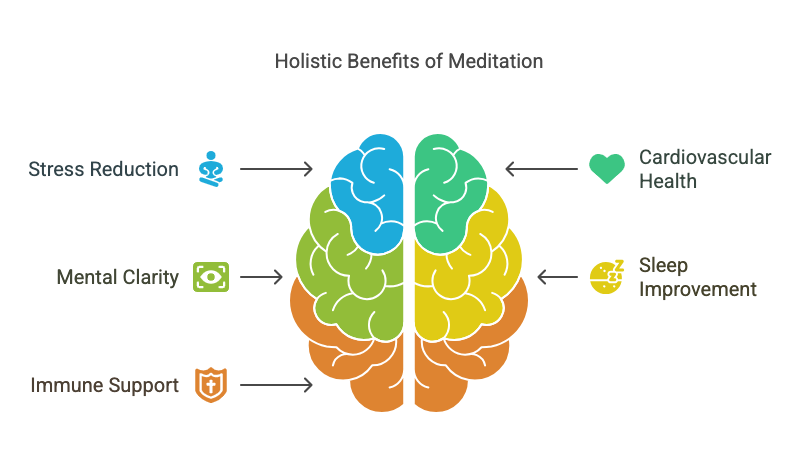Managing Adverse Effects Of Stress On Our Body Through Meditation
 Science of Spirituality
Science of SpiritualityHow many of us can confidently say that daily challenges do not leave us feeling stressed? In today's fast-paced world, stress has become an inevitable part of our lives. But what exactly is stress? How does it affect our well-being over time? More importantly, how can we manage and reduce its impact on our bodies and minds?
Stress and Its Effect on Health
Medical research has shown that stress plays a significant role in our overall health. It weakens the immune system, making us vulnerable to various illnesses. Stress also disrupts essential bodily functions that help us resist disease. When we experience stress, the body activates the "fight or flight" response, triggering biochemical reactions.
In a stressful state, our heart rate increases, and hormones such as adrenaline and cortisol are released to prepare us for danger. However, in modern life, this response is frequently triggered by everyday concerns rather than actual threats. These stress hormones linger in the body, causing long-term health issues.
The Impact of Chronic Stress
When stress persists, our body remains in a heightened state of alertness, even when there is no real danger. Since we are neither fighting nor fleeing, this accumulated stress has no outlet, leading to physical and emotional strain. Over time, chronic stress can cause various health problems, including:
High blood pressure and heart disease
Digestive disorders
Skin conditions
Anxiety and depression
Weakened immune function
How to Meditate: A Solution to Stress
Unmanaged stress can severely impact our well-being, but there is a simple and effective way to counteract its effects—meditation. Learning how to meditate allows us to cultivate inner peace and resilience in the face of challenges. By meditating, we develop the ability to calm our minds and prevent stress from overwhelming us.
To begin meditation, follow these steps:
Find a Quiet Space – Choose a peaceful environment where you won't be disturbed.
Sit Comfortably – Maintain a relaxed yet alert posture.
Focus on Your Breath – Pay attention to your inhalation and exhalation.
Acknowledge Thoughts Without Judgment – Allow thoughts to come and go without attaching to them.
Return to the Present – If your mind wanders, gently bring your focus back to your breath.
With consistent practice, meditation becomes a valuable tool in reducing stress and achieving mental clarity.
Benefits of Meditation: Healing the Body and Mind

The benefits of meditation extend beyond relaxation. Studies show that regular meditation practice can:
Lower stress levels and improve emotional well-being
Reduce blood pressure and support cardiovascular health
Enhance concentration and mental clarity
Promote better sleep by calming the nervous system
Strengthen the immune system and overall resilience
Integrating Meditation into Daily Life
By making meditation a habit, we can train ourselves to remain calm in stressful situations. Instead of reacting impulsively, we can take a moment of silence to regain composure. Over time, meditation becomes a natural defense mechanism against stress, helping us navigate life's challenges with ease.
Moreover, when others observe the peace and balance we gain from meditation, they may be inspired to adopt the practice themselves. By setting an example, we contribute to a more mindful and stress-free environment for everyone around us.
Final Thoughts
Incorporating meditation into our daily routine can transform how we experience stress. As we learn how to meditate and embrace the benefits of meditation, we empower ourselves to lead healthier, calmer, and more fulfilling lives. By practicing meditation, we not only improve our well-being but also inspire those around us to embark on their own journey toward peace and mindfulness.
Subscribe to my newsletter
Read articles from Science of Spirituality directly inside your inbox. Subscribe to the newsletter, and don't miss out.
Written by
